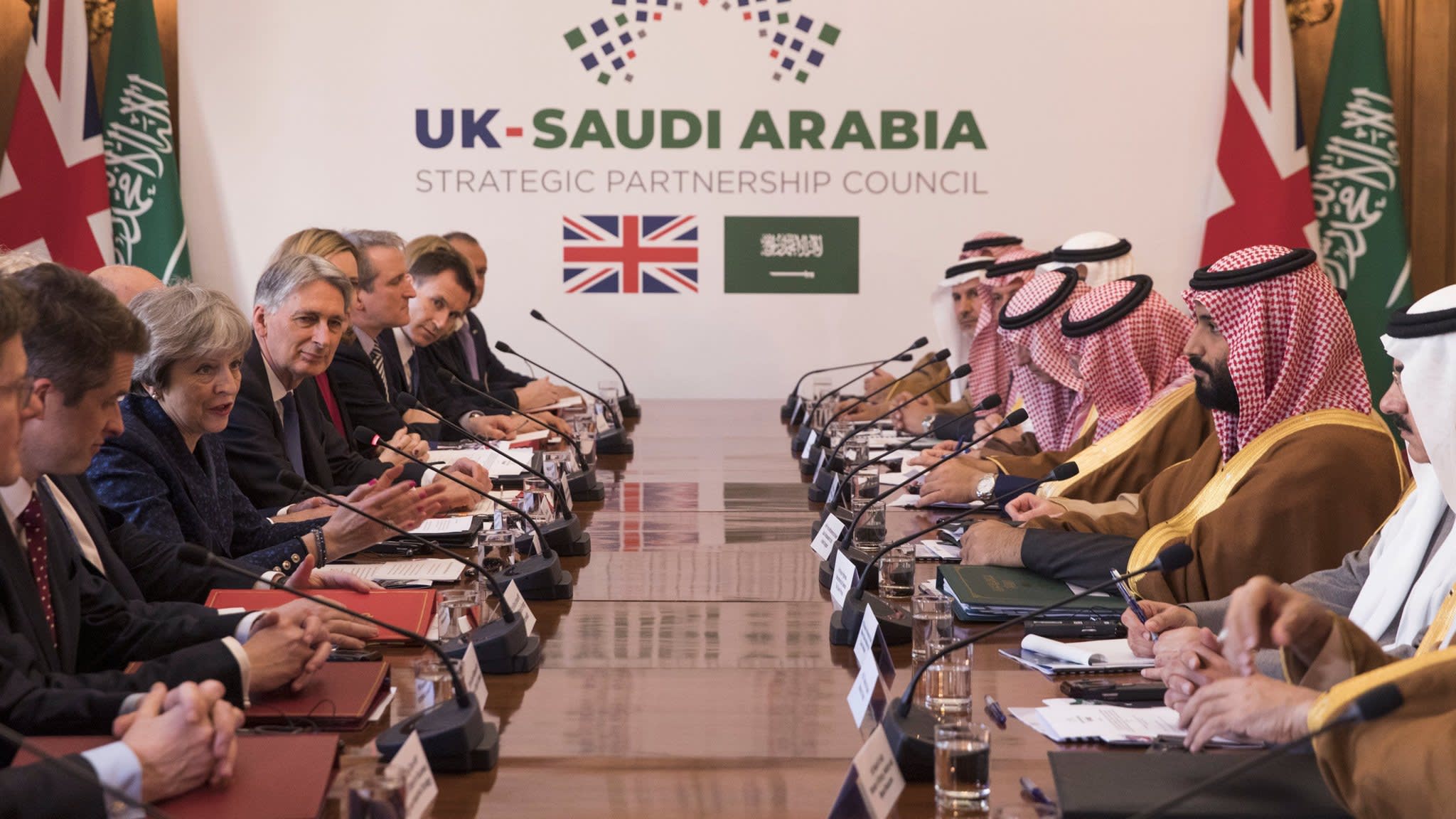Business chiefs flock to build bridges with Saudi prince
Any business aficionado wandering along Mayfair’s Curzon Street on Thursday afternoon would have been treated to a surreal sight: 15 of Britain’s top chairmen and chief executives trooping on to a coach. “It was like a school trip for the captains of industry,” joked one blue-chip director.
The coach took nearly an hour to make the two-mile journey to the Saudi ambassador’s residence, threatening to make the leaders late for an audience with Mohammed bin Salman, the Saudi crown prince, and Philip Hammond, UK chancellor. “Fortunately MbS was himself running late,” said another attendee.
That Britain’s business leaders let themselves be herded about the British capital in a coach is a sign of the expectation that accompanied Mohammed bin Salman’s first official visit to the UK as crown prince. As it drew to a close, both sides could claim a measure of success.
For London, the signing of a long-awaited Memorandum of Intent for the order of 48 Typhoon fighter jets from BAE Systems was a notable achievement. Other good news included the pledge of £65bn in investments and the assurance by Khalid al-Falih, the Saudi energy minister, that London remained “in contention” for the coveted initial public offering of Saudi Aramco, the oil company.
The Saudis held high-level meetings with government figures and business leaders. Expected mass protests against the crown prince over Saudi Arabia’s role in the war in Yemen were smaller than expected — in contrast to the huge demonstrations that greeted his uncle, King Abdullah, in 2007.
Recommended
Deepening the UK-Saudi partnership is a part of the young crown prince’s Vision 2030 reform plan, which has set ambitious targets for diversifying the Saudi economy away from its dependence on oil.
Riyadh is anxious to reassure investors that it is a stable place to invest, especially after the imprisonment of princes and business figures in a sudden corruption crackdown by Mohammed bin Salman last November.
“We need to reassure the market that this is over,” said Mohammed al-Tuwaijri, Saudi Arabia’s minister of economy and planning. “And it is over.”
Against the background of Britain’s departure from the EU, both sides see scope for greater business co-operation beyond the arms deals that have long bound the UK and the Kingdom.
“The Saudis clearly sense an opportunity post-Brexit to be ever more relevant,” says one business leader closely involved in the relationship.
The linchpin of this partnership is Ken Costa, the veteran investment banker appointed as the UK government’s special adviser to Vision 2030 — and whose job it was to ensure that this week’s visit went according to plan.
“Ken is just the right kind of man to be our point person,” says one top business figure. “He injects a bit of humour into proceedings and the Saudis like him.”
Others were less complimentary, suggesting that other figures would be more effective.
However, Mr Costa this week helped orchestrate the debut meeting of the UK-Saudi Arabia Strategic Partnership Council, co-chaired by Mrs May and MbS, where a pledge for £65bn of “mutual trade and investment” was made.
He also assisted with a conference at Mansion House on Thursday and shepherded the business leaders’ meeting with the crown prince at the ambassador’s residence.
Mr Costa’s priority is to help identify areas where British companies and agencies can assist in delivering the Saudi reforms, increasing the private sector’s contribution to the Kingdom’s GDP from 45 per cent to 60 per cent by 2030.
Wholesale privatisation, including the $100bn Saudi Aramco IPO, is set to fund economic diversification schemes to raise the state’s non-oil revenues and aims to reduce unemployment from 12 per cent to 7 per cent.
The UK business leaders were bussed to their meeting with the crown prince and the chancellor to see what this could mean for them. Ahead of their meeting, UK officials had put “opportunities” into “buckets”, with preferred partners encouraged to sign deals with the Saudis and given “scripts” to help them negotiate.
If the objective was to convince us there was more to the future of Saudi relations than arms deals, then it worked. But there was nothing substantive at all
Preferred partners in the finance and investment ‘bucket’ included HSBC, Standard Chartered, Lloyd’s of London, Schroders, Standard Life, Legal & General, Man Group and Winton Capital. The engineering and life sciences “bucket” included Atkins, BAE Systems and Wood Group; media spanned BT, Vue International and WPP.
Participants were plied with mint tea and Arabic coffee, and were addressed by Mohammed bin Salman. “It was an impressive lecture,” said one person who was there.
But the event was arranged with barely 24 hours’ notice — too late for most firms to sign any initial agreements. This generated complaints from many attendees. Others who attended were disappointed that there had been little opportunity to talk about their businesses, and no question-and-answer session.
“If the objective was to convince us there was more to the future of Saudi relations than arms deals, then it worked,” says one participant. “But there was nothing substantive at all.”
[“Source-gadgets.ndtvft”]





